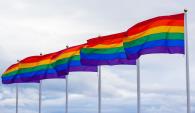
Rejecting a more narrowly tailored definition of homosexuality as is used by some other states, the NJ legislature specifically includes many employees to be protected workers who have a right to employment without discrimination because of affectional or sexual orientation, sex, gender identity or expression as well as some other protected classes.
The New Jersey Law Against Discrimination (NJLAD) Has a Broad Definition of “Homosexuality” as to Protected Workers.
This broad definition give legal protection to many persons who otherwise would not be covered under the legal protective umbrella of the NJLAD. The statute states that:
“Homosexuality means affectional, emotional, or physical attraction or behavior which is primarily directed towards persons of the same gender.”
The NJLAD specifically stipulates that all NJ workers have a right to employment without discrimination because of affectional or sexual orientation, sex, gender identity or expression as well as some other protected classes.
In places of employment and in school law, a perception of homosexuality is as covered a class as is actual homosexuality.
In an early case, a student was being harassed because other students perceived him to be a homosexual. The Court held that the objective viewpoint was “a reasonable student of the same age, maturity level, and protected characteristic” L.W., 915 A.2d at 547 (citing Lehmann, 626 A.2d 445). This Court held that even when there was no evidence of anti-homosexual hostility in school the perspective of the reasonable person must be of one in the same protected class as the plaintiff considering the entirety of the circumstances.
The NJLAD broadly defines these related protected classes of NJ workers as follows:
“Affectional or sexual orientation” means male or female heterosexuality, homosexuality, or bisexuality by inclination, practice, identity, or expression, having a history thereof or being perceived, presumed, or identified by others as having such an orientation.
“Heterosexuality” means affectional, emotional, or physical attraction or behavior which is primarily directed towards persons of the other gender.
“Bisexuality” means affectional, emotional, or physical attraction or behavior which is directed towards persons of either gender.
“Gender identity or expression” means having or being perceived as having a gender related identity or expression whether or not stereotypically associated with a person’s assigned sex at birth.
There still exists illegal harassment in some workplaces for workers who are perceived by others to be homosexual. In New Jersey, employment harassment or discrimination based on a perception of homosexuality is as illegal as illegal as is harassment because a person is homosexual.
Employees sometimes erroneously believe they have no legal recourse when they are being harassed for being a member of a protected class if they are not in fact in that class, i.e., being gay if they are not gay. Not true!
Don’t Sit on Your Rights
I am an aggressive and compassionate employment law attorney who is experienced and successful in representing LGBTQ executives and in obtaining monetary compensation for their being subjected to discrimination. I have successfully represented LGBTQ employees who were either terminated or forced out of their employment because of the bias against them and was successful in recovering money for them. I have also been successful in obtaining monetary compensation for persons who experienced harassment because they were perceived to be gay but who were not gay.
If you are being subjected to such unlawful workplace discrimination, contact Hope A. Lang, Attorney at Law today for a free consultation.
New Jersey employment attorney, Hope A. Lang, Attorney at Law serves clients throughout the state, including Bergen, Middlesex, Essex, Hudson, Monmouth, Ocean, Union, Camden, Passaic, and Morris Counties with locations in Southern, Central, Western and Northern NJ to meet with clients.